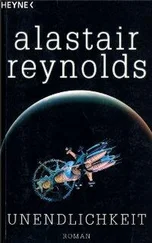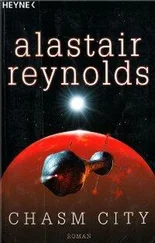After a moment, it occurred to Goma to ask, ‘How long have you been here, Ru?’
‘You’re cross I didn’t call you sooner?’
‘No, I’m worried that you’ve been here hours and hours without thinking of yourself. You brought water for Agrippa, but I don’t see anything for you.’
‘There’s water in my buggy.’
Goma had passed the other vehicle long before she reached the herd. She doubted Ru had been back to it since reaching the fallen matriarch. ‘Wait here,’ she said, risking placing a hand on Ru’s shoulder by way of comfort.
She was as quick as she could be, but not so hasty that her movements would further disconcert the herd. In Ru’s buggy she found water flasks and a wide-brimmed hat. A little further back, where she had parked her own vehicle, she found a pair of survival blankets and a box of emergency rations. She bundled everything into the blankets and headed back to Ru.
Ru took her flask distractedly at first, as if being reminded to drink were a nuisance. But after she had swallowed a mouthful, she gulped the rest in sudden thirst.
‘Thank you,’ she said, with a certain wariness, as if the words might put her in some unspecified debt to Goma.
‘It’s all right. I’ve got these blankets, too. They should keep her a little cooler.’
The blankets only covered part of the elephant, but they did the best they could to make her comfortable. Goma opened the ration kit and showed Ru the contents, then tore the foil from an energy bar and bit into it.
‘I wonder if there’s more we should do,’ Ru said, wiping her mouth. ‘Then I wonder if we’re already doing too much. Prolonging something that shouldn’t be prolonged.’
‘You couldn’t just leave her,’ Goma said. ‘I know you. And this is a kindness, so don’t start doubting yourself. All you’re doing is easing things for her, not making it worse. Seriously, how long has it been?’
‘Seven hours. Maybe eight. I arrived just after sunrise.’
‘Then in a little while I want you to go back to the buildings. I bet you didn’t bring your medicines, did you?’
‘She’s what matters now.’
‘No, you matter, too — to me, anyway. You drive back and I’ll stay here. We can take turns holding vigil.’
‘I won’t leave her.’
‘She could be like this for days.’
‘I think it will be faster. Her breathing’s weaker than it was a few hours ago.’
‘All the same, you still have to think of yourself.’ Goma allowed her hand to rest on Ru’s shoulder again. It was what one colleague would do for another, she told herself, a gesture of emotional support that had nothing to do with their shared history.
‘I’m all right. But I was getting a little dehydrated. I didn’t realise it until now.’
Two of the senior females had come closer while this exchange took place, testing their trunks against the rise and fall of Agrippa’s ribcage. It was as if they needed validation that their matriarch had not yet taken her final breath, drawing the air of this alien world into her lungs one last time.
‘They know,’ Goma said.
‘Of course.’
Of all the animals, only elephants had a sophisticated understanding of death. They knew the difference between breath and bones. They had their own customs of grief and remembrance. More than once, Goma had found herself wondering if it was precisely this apprehension of mortality that had primed the elephants for taking the next step on cognition’s ladder, a rung up to language and sentience. To know death was to know time, to know the past and the future. Most creatures were bound entirely to the present moment, blissful prisoners of an ever-moving now. They knew hunger or anger, contentment or lust, but they did not know doubt or longing or regret.
Elephants knew that their tomorrows were not numberless, that each day was a gift. In that awareness lay both their majesty and their tragedy.
Ru would not be persuaded to leave her vigil for more than the few minutes necessary to wander to the bushes to relieve her bladder. On the way back, she stopped at her buggy, washed her hands and face and hair and scraped dust from her eyes. She refilled the portable water flasks and found extra rations, tucked into a forgotten compartment. As the sun moved, they adjusted the blankets.
Ru was right, Goma decided. After two hours, even she had noticed that Agrippa’s breathing had deteriorated.
The knowledge had communicated itself to the other elephants, too. The next-oldest Alpha-herd females, Arpana and Agueda, appeared to be assuming the role of matrons at a deathbed, ushering the other elephants to their matriarch’s side and ensuring that none lingered at the expense of another. Even the younger males looked more sombre in mood than when Goma had arrived. Armistead, the male calf who had nearly knocked her down, was emulating the trunk-touching of the older animals. He might not have understood the significance of the affair any more than a human child grasped the deeper implications of a human funeral, but Goma could not help but be moved by the sense of shared observance. Ru was right. They knew.
What were we thinking? Goma wondered to herself. Why did we ever think that elephants needed to be more like us and less like themselves?
Soon the hour was upon Agrippa. They had moved the blankets again and again, but during the course of the afternoon her breathing had grown progressively less detectable, her eye responses weaker, her trunk almost still. They continued their ministrations, sponging her skin and eyes, offering what solace they could with the gentle laying on of their hands. Until the moment when Ru said: ‘She’s gone.’
Goma had felt it, too, but not had the courage to say so for fear that voicing her suspicion might be enough to make it real.
‘Yes, she is.’
Ru could not stop moving the sponge across Agrippa’s face. Feeling the same impulse, Goma shifted the blankets again. There had been no convulsive final breath, no obvious marker of life’s passing. It had simply happened, as steadily and irrevocably as the movement of the sun.
But she noticed a shift in the other elephants’ behaviour. The laying on of trunks had become more desperate. They were touching and prodding her with trunks and feet now, evidencing a forcefulness that to a human’s sensibilities appeared almost indecent. It was as if they were angry at what she had done and wished to scold her back to life. They know , she thought again. They know but they do not fully understand. That will take time.
‘Thank you,’ Ru said, and for a moment Goma thought her words were addressed to the matriarch. Then Ru added, ‘I wanted you to be here. I hoped you’d come, but I wasn’t sure you would.’
‘I’m glad I made it in time. I’m so sorry, Ru. We knew this day was coming, but that doesn’t make it any easier.’
‘She was a good elephant. Whoever accepts her place will have a lot to live up to. I’ve changed my mind, by the way — I’m coming with you.’
Ru barely drew breath between sentences. Goma heard the words, but her natural reaction was to doubt them, or search for a different meaning.
‘With me where?’
‘To Gliese. I made my mind up a couple of days ago, and I would have told you sooner or later.’ Ru was at last able to rise from the ground, scuffing dirt from her knees. ‘I suppose I wanted to live with my decision for a while, to see if I still liked it.’
‘I’m… sorry.’ Goma barely knew how to respond. ‘Of course I want you to come, but I don’t think it’s possible now. They’ve filled all the slots.’
‘I’ve already spoken to your uncle. He was the first person I discussed this with.’ Ru gave an easy shrug. There were dark patches under her armpits, inverted triangles like two little maps of Africa. ‘I know I was meant to be removed from consideration, but I think leaving me on the list was Mposi’s way of giving us a chance of reconciliation.’
Читать дальше












